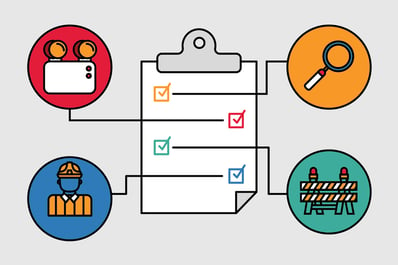What Is Mitigation?
Mitigation strategy is all about lessening the impact or preventing the causes of emergencies within your facility. This includes conducting regular inspections alongside stocking the right supplies and monitoring your hazardous materials. Disaster mitigation can be the single most effective way to prevent or limit the impact of a disaster.
Review this checklist to see if your employees are taking on the right tasks to avoid or reduce the impact of emergencies and to ensure that your facility is ready to react fast.
Mitigation Inspections
- Are your facilities inspected regularly, based on your equipment and size?
- Are specific employees tasked with inspections?
- Are manufacturer recommendations included in the inspection plan?
- Are areas of your facility and equipment managed differently based on risk?
- Is outdated or broken equipment immediately turned off and/or removed from service until inspection or repair?
- Is a list of essential equipment provided and kept up to date?
- Are generators, emergency lights, monitoring equipment and other emergency equipment all working properly?
Emergency Response Supplies
- Is the right emergency response equipment provided onsite, including supplies for spills, medical emergencies and leaks?
- Are supplies of emergency response products regularly inspected and refreshed?
- Are emergency closets and stations labeled and kept clear of other equipment and products?
- Do you have a program in place to keep emergency response products stocked automatically?
- Are emergency products stored in locations near employees or critical equipment?
- Is the supply of emergency response products adequate to respond to all potential emergencies onsite?
- Do your employees know where to go to access emergency response products?
Hazardous Materials
- Are all hazardous materials onsite labeled, cataloged, and reviewed regularly?
- Are cleaning supplies and other non-essential hazardous materials stored away from other materials?
- Are the potential interactions between all hazardous materials onsite known and documented?
- Are chemical safety datasheets available for all employees on or near chemical storage areas?
- Are specific plans in place to secure hazardous materials against known risks to your facility?
Please note this list is not comprehensive of all of the steps you may need to take to mitigate emergencies, but each question can and should be answered as part of your mitigation strategy plan.
Check out these resources for other ways to stay prepared in the event of an emergency.
|
CenterPoint Group provides discounts to key suppliers such as Office Depot, Enterprise and National Car Rental, Altour Corporate Travel, W.W. Grainger, Verizon Wireless and more... |








Leave a Reply
Comment policy: We love comments and appreciate the time that readers spend to share ideas and give feedback. However, all comments are manually moderated and those deemed to be spam or solely promotional will be deleted.